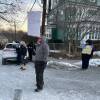Boston Mayor Michelle Wu is moving to limit protests targeting the homes of specific Boston residents — including her own house in Roslindale, which has become the epicenter of vocal, often aggressive opposition to the COVID-vaccination requirements she announced late last year.
An ordinance Wu filed Monday would ban such protests between 9 p.m. and 9 a.m. The Boston City Council now has sixty days to accept or reject the ordinance, which will also take effect if no action is taken within that time.
In an interview with GBH News, Wu stressed that the ordinance doesn't apply to all protests taking place in, or passing through, residential areas.
"This only would apply to picketing that is targeted at a specific residence — a specific home, or people within a home," Wu said.
More Politics
"Boston has a strong legacy of activism and protests and demonstrations that are very important to uphold within our First Amendment rights," she added. "I have been at plenty. ... [But] in this case, we are putting reasonable parameters around the time of day, because this is where it really comes up against quality of life, and ensuring that we are supporting residents in our neighborhoods to be able to have the health and well-being of getting sleep at night and in the morning."
The COVID requirements Wu announced last December included a beefed-up vaccine mandate for Boston employees, who had previously been able to test negative for COVID in lieu of getting vaccinated. A state appellate judge recently stayed implementation of that mandate. The city is appealing the ruling.
Also in December, Wu announced that Boston would require that people entering various private establishments provide proof of vaccination. The city has since lifted that requirement, citing improved COVID metrics.
Wu has previously decried the tone and impact of the protests near her home, which she shares with her mother, husband and two children. In a January 18interview on GBH News's Boston Public Radio, she described the protesters as "people who feel that the way to get their point across, or express their strong emotion, is through violating boundaries of decency, of what's appropriate."
"I hope my neighbors will forgive me at some point," Wu said at the time.
Protests at the homes of elected officials have become a political mainstay of late, thanks largely — though not entirely — to intense opposition directed at measures aimed at containing the pandemic.
In Michigan, protesters displeased by COVID-mitigation measures have gathered outside the official residence of Democratic Governor Gretchen Whitmer. In New Hampshire, they've assembled at the Newfields home of Republican Governor Chris Sununu, despite an anti-picketing ordinance aimed at dissuading them. And in Massachusetts, protesters who span the political spectrum have repeatedly targeted Governor Charlie Baker's home in Swampscott to voice an array of grievances.
Swampscott town administrator Sean Fitzgerald told GBH News that, after weighing what type of response could survive a court challenge, that community will likely consider steps aimed at limiting protest noise levels during its May town meeting.
"We just need to ensure that if we have something, it's going to be constitutionally enforceable," Fitzgerald said.
"Freedom of speech is a bedrock element of this democracy, and certainly we all support that," Fitzgerald added. "[But] I've had police officers who have had to go out with injuries because of impairments due to the loudspeakers at these protests. It's affecting our employees and it's affecting the community."
A proposal to limit protests outside elected officials' homes is also under consideration at the Massachusetts State House. A bill filed by state Representative Steven Howitt (R-Seekonk) would ban protests within 100 yards of elected officials' homes.
In an interview conducted before Wu filed her proposal, Howitt expressed concern about the long-term effects of protests that target politicians' residences, regardless of the sentiments voiced by demonstrators.
"Any time someone decides to run for public office and put their name out there, it's usually a family decision, whether it's a husband or a wife or a child," Howitt said. "They discuss the pros and cons of why they want to give back to their community, or to the state or to the country.
"But if you have people that come to a person's house, or a group of people that come to the person's house and protest, to some people it can be intimidation," Howitt added. "And so good people may decide not to run because they feel, why should they put their families in harm's way? And I say 'in harm's way' because you never know when a peaceful demonstration, as we've seen in the past, can turn violent."
Wu, however, is focused less on worst-case scenarios than the strains she and her neighbors have experienced over the past several weeks.
"When there's the potential for continued experience of targeted harassment, day after day after day, in those early-morning hours or late-evening hours, that's when it really infringes on a community's ability to have the sanctity and peace of your home," she said.
Wu, who graduated from Harvard Law School, also said she's confident that her ordinance — which establishes no new limitations involving distance or volume — could withstand a legal challenge.
"The First Amendment protects our right to be able to gather together, to express your views and opinions, but it's not an unfettered right," Wu said. "It's not a limitless blank check for anyone to be able to say whatever you want, in any place, to anyone, at any noise level or with any language.
"There are lots of restrictions on that that we are used to seeing, whether that is restrictions on hate crimes, or slander and libel, or noise, levels of sound," she added. "And so it's been affirmed, and it's understood, that the First Amendment ... can have reasonable time-place-and manner restrictions put in place, in order to balance all that we need as a healthy society and a peaceful community."








